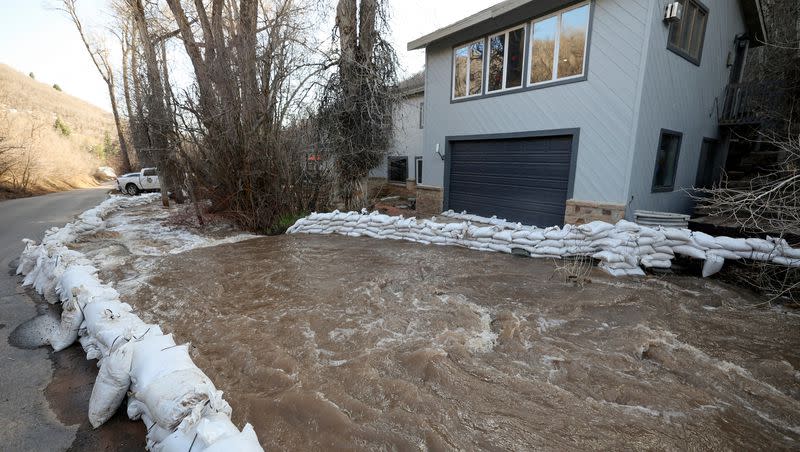Here are the actions Utah lawmakers may take to deal with coming floods

Utah lawmakers are set to pour millions of dollars into dealing with the effects of last winter’s record snowfall during Wednesday’s special legislative session called by Gov. Spencer Cox.
Bills that will be considered include extending the state of emergency Cox declared last month and shifting more than $30 million in state funds to cover budget-busting snowplowing costs as well as some of the damage being done as the snow melts.
Related
The worst flooding is yet to come, with peak flows not expected until late May into June, Glenn Merrill, a senior hydrologist with the National Weather Service told members of the Legislature’s Executive Appropriations Committee on Tuesday.
So far, most of the flooding seen in the state has been from low- to mid-level snowpack, he said. “Many of our significant watersheds are high-elevation watersheds that haven’t even really seen their snow start melting yet.”
But that’s about to change thanks to more moisture and hotter than normal temperatures.
Those areas are likely to see “rapidly changing conditions this week and then starting to flirt with flood potential by about the 22nd,” he said, which will cause many of the significant waterways across the state to soon near or exceed flood stage.
“We’re talking the Cottonwood creeks here in the Salt Lake Valley, we’re talking Logan River, we’re talking the Provo River, potentially the upper Weber,” Merrill said. “We’re talking increased flows for the Green River and the Colorado as well.”
After hearing that forecast, the legislative leaders who serve on the committee unanimously backed HB1001, which moves $20 million from the Utah Department of Transportation’s highway construction budget into maintenance.
Related
The department spent $41 million on snowplowing over the winter, about 70% more than budgeted. Runoff is already affecting state roads, washing away a chunk of state Route 39 in Ogden Canyon and causing mudslides in Little Cottonwood Canyon.
The bill, sponsored by House Budget Chairman Val Peterson, R-Orem, would also use $10 million set aside for wildfire suppression for infrastructure repairs, along with $6 million for emergency response.
The committee also gave the Utah Department of Public Safety the authority to spend up to $5 million in the current budget year ending June 30 and $5 million in the following budget year “in connection to response efforts for the historic snowpack and flooding events.”
Later Tuesday, Department of Natural Resources Executive Director Joel Ferry told the Legislative Water Development Commission that even after all of the runoff so far, there’s still more snow in the state’s mountains than all of last year or the year before.
“We’ve never seen so much moisture, so much snowpack, since measuring began,” Ferry said. The water year is so good that 37% of the state “is not in any sort of drought at all” at this point.
“It’s crazy how much water is coming down,” he said, noting statewide, an average of 60% of the water equivalent in the snowpack has melted so far. But there’s still almost 70 inches of water at Snowbird, Ferry said.
More than 100 “active sites” are being monitored in the state because of what’s already record soil saturation, Ferry said, warning runoff could make some areas prone to landslides.
“These are enormous amounts and volumes of water that still have to come down and that’s why we still need to be prepared. That’s why the governor has asked the Legislature to extend the emergency order,” he told the committee.
Having the emergency order in place “helps us in mobilization, in utilizing resources that we have set aside,” Ferry said. “We’ve got a long way to go. Flood risk is still a significant concern.”
HJR1 would extend Cox’s emergency order through mid-August, acknowledging “that the risks of flooding and other dangerous conditions and effects will likely persist for several months.”
Because the governor called the special session, he set the agenda for lawmakers. HB1002 would tweak a gun bill from last session to make sure people in Utah on a non-immigrant work visa can own a firearm.
Late Monday, Cox added two items just before the final deadline, a list of appointees he wants the Senate to approve and a modification to firefighter death benefits that’s in HB1003.
The special session is scheduled to begin at 4 p.m. Wednesday.

